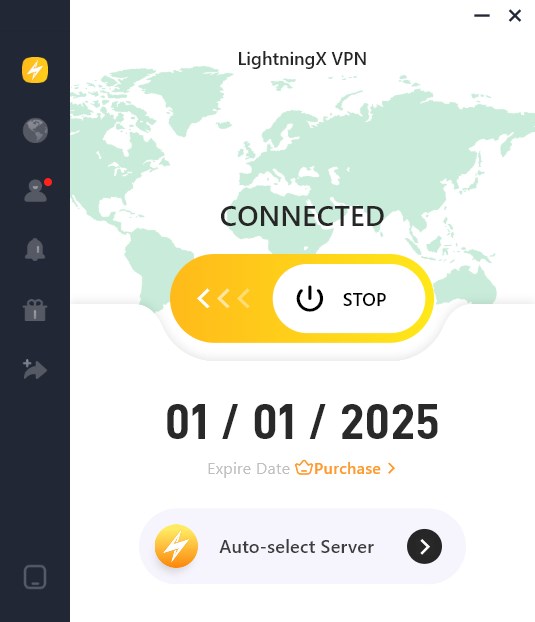VPNs are widely recognized as an effective privacy protection tool, but they are not completely untraceable. This article will explore whether VPNs are tracked and who they might be tracked by. With this blog, you can become clearer about the importance of staying cautious when using a VPN.
Does a VPN Hide Private Information?
Yes! A VPN (Virtual Private Network) can hide your private information to a certain extent. It can change your IP address, encrypt your internet traffic, and protect your online activities.
A VPN will create a secure, encrypted connection between your device and the Internet. This stops others from monitoring or intercepting your data. By masking your IP address and location, a VPN keeps your online activities private and shielded from prying eyes.
However, VPNs don’t guarantee complete anonymity. If you use an unreliable VPN or share personal info when logging in, your privacy might still be at risk. To protect yourself better, choose a trustworthy VPN with strong privacy measures.

Can You Be Tracked If You Use a VPN?
While a VPN might provide critical protection, it will not render you fully anonymous or untraceable. We should additionally consider the following points:
VPN Logs: Some VPN services may store logs of your sessions. This includes the time you used the service, your IP address, and the data you transferred. If these logs are saved, they could be used to track your activity. Avoiding this information falls into the hands of unauthorized individuals, such as hackers.
DNS Leakage: Sometimes your device performs DNS (Domain Name System) lookups outside of the VPN tunnel. This means that your ISP may be able to recognize the websites you visit, especially if the VPN is not properly configured or the operating system is vulnerable.
Web Tracking Technologies: Even if you use a VPN, some websites can still track you using cookies, browser fingerprinting, and other technologies that do not rely on IP addresses.
Legal and Law Enforcement: Authoritative law enforcement agencies can track your online activities. They may do this by working with ISPs, VPN providers, or other monitoring methods.
Personal Usage Habits: Despite hiding your IP address and encrypting your data, your online behavior patterns can be used to break your identity. Information such as when and where you connect and which websites you visit can be tracked.
Related: How to Change VPN Location – A Detailed Guide
Who Can Track You Online?
Several entities and technologies can track your online activities to varying degrees:
VPN Providers: While reputable VPN providers claim not to log user activity, some may keep connection logs or other data for troubleshooting or maintenance purposes. Choosing a VPN provider with a transparent privacy policy and a strong commitment to user privacy is critical.
Internet Service Providers (ISPs): ISPs may track your browsing history, the websites you visit, and the content you access. For-profit or official needs, they may sell this data to advertisers or give it to law enforcement.
Websites and Online Services: Websites use cookies, browser fingerprinting, and other tracking methods to monitor your behavior. They track your browsing habits to deliver targeted ads and often collaborate with advertisers to get detailed information about you.
Social Media Platforms and Advertising: Social media platforms track your interactions, likes, shares, and comments. Personalized advertisements are placed in response to your information. Their user data may also be shared with third-party advertisers.
Government Agencies: Law enforcement and intelligence agencies may track online activity. They may partner with Internet service providers and technology companies or use advanced surveillance technologies to monitor individuals.
Hackers and Cybercriminals: Hackers may use several techniques such as malware, phishing attacks, or exploiting vulnerabilities in networks and devices. These bad techniques track and steal personal information. This can allow hackers to make quick financial gains or serve other malicious purposes.
Educational Institutions: If a school or educational institution requires you to use the internet or a VPN, they may monitor your internet activity on their devices and networks. This monitoring helps ensure compliance with their policies and prevents misuse of information.
Related: Does a VPN Hide Your IP? Here’s What You Need to Know
How to Avoid Being Tracked with a VPN?
To effectively avoid being tracked while using a VPN, you can consider these key strategies:
Choose a Reputable VPN Provider: Select a reputable VPN provider that prioritizes user privacy, has a strict no-logs policy, and uses strong encryption protocols.
Enable Kill Switch: Enable the VPN’s kill switch feature, which automatically cuts off your internet connection if the VPN connection drops. This prevents your IP address and activities from being exposed inadvertently.
Use DNS Leak Protection: Make sure your VPN has DNS leak protection to stop DNS queries from bypassing the VPN tunnel and potentially revealing your browsing activities to your ISP.
Choose Private Browsing Modes: Use private or incognito browsing modes in your web browser to keep cookies, history, and other tracking data from being saved on your device. This helps you maintain your privacy and keeps your browsing habits from being stored.
Regularly Clear Cookies and Cache: To keep your online activity more private, make it a habit to regularly clear cookies, cache, and browsing history from your web browser. This helps reduce the amount of identifiable information stored on your device.
Disable Location Services: Turn off location services on your devices, as this information can be used to track your physical activities.
Use Secure Connections: Always connect to websites using HTTPS (encrypted connection) instead of HTTP. HTTPS encrypts the data between your browser and the website, keeping it safe from interception.
Ad-blockers: Ad-blockers are effective tools that help users prevent being tracked while browsing the internet. They protect user privacy by blocking third-party trackers, cookies, and other tracking technologies. These blockers speed up page loading and reduce distractions. They can also prevent ad networks from collecting your personal information.
Regularly Update Your VPN Software: Stay informed about online privacy issues and make sure you understand the privacy policies of the websites and services you use. Regularly review and adjust your privacy settings to keep your online activities private and avoid being tracked.
Clear No-log Policies: VPNs with a clear no-log policy offer better privacy protection. Since these services don’t keep records of your internet activity, connection times, or IP addresses, your personal information stays secure.
The Best VPN for You
LightningX VPN is a VPN application that offers high speed, stability, and security. It features one-click connectivity, full privacy and security, unlimited browsing, no bandwidth or speed limitations, and no logging policy.
The VPN has more than 2000 worldwide servers across 50+ countries. In addition, LightningX VPN offers free trials and affordable subscription plans.
- Provide fast, private, and unlimited connections. A strict no-log VPN.
- Enjoy unlimited internet activity like streaming, downloading, and browsing with no restrictions on bandwidth.
- LightningX VPN’s accounts support multiple devices online at the same time
- Offer many subscription options including weekly, monthly, quarterly, and yearly plans ($0.99 per day, $5.99 per month, $59.99+1 Year Free per year) to meet the needs of different users.
- Protect online privacy by hiding IP information and securing data to prevent leakage.

Conclusion
In summary, while a VPN enhances online privacy and security, you need to choose a reputable VPN provider with strong encryption technology. Furthermore, appropriate online habits like using privacy-focused browsers, regularly clearing cookies, and being cautious with personal information will help reduce the possibility of being tracked.
















